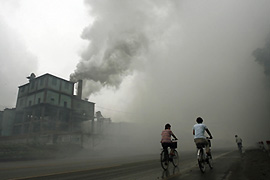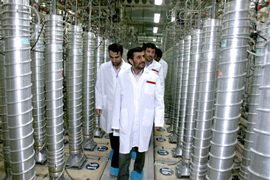Hu and Obama pledge climate action
Chinese and US leaders emphasise co-operation at first summit in Beijing.

In carefully-scripted statements, Hu and Obama presented a broadly united front, although they did touch briefly on points of ongoing contention in the fields of trade and human rights.
Hu warned of the need to “oppose and reject protectionism in all its manifestations” – hinting at growing concern in Beijing over recent moves by the US to impose tariffs and raise duties on some Chinese imports.
Obama, meanwhile, reiterated his comments a day earlier about the importance of universal respect for human rights – long an issue of friction between the US and China.
‘Careful’ remarks
Frank Sieren, an author on China, said the two leaders still do not trust each other.
“President Hu and Obama looked to me like two wrestlers hugging each other but don’t really get forward or backwards, and they were both kind of careful not to lose their face … they don’t want to press each other too much,” he told Al Jazeera.
|
“As the two largest consumers and producers of energy, there can be no solution to this challenge without the efforts of both China and the United States” Barack Obama, |
“I think this is the first kind of meeting in China; they’ve met a few times before. So we have to wait [and see] how this relationship will develop, but they look like two guys who won’t have a barbecue soon.”
Nonetheless, the US president said the joint interests of the two nations far outweighed their differences, adding that the US-China relationship “goes far beyond any single issue”.
“I do not believe that one country’s success must come at the expense of another,” he said.
Kerry Brown, a China analyst at the London-based think tank, Chatham House, told Al Jazeera: “The relationship [between the two countries] has changed and evolved, but I think that America can see its interests in terms of China being economically stable, politically stable and a positive force.
“Obviously it’s got issues with its [China’s] military spending, its lack of transparency and with its political model sometimes.
“But I think the communique that they both issued yesterday [Monday] shows they both have common interests. They want to work on those, especially economic problems.”
Greenhouse agreement
In the run-up to the Copenhagen climate talks next month, both leaders stressed the importance of co-operating to come up with a workable deal to tackle climate change and cut emissions.
The US and China are the world’s two largest emitters of so-called greenhouse gases.
 |
| Fears are growing that the Copenhagen climate summit will fail to agree a deal [AFP] |
Looking ahead to Copenhagen, Obama said he had agreed with his Chinese counterpart that they should aim for global pact that has “immediate operational effect”.
“This kind of comprehensive agreement would be an important step forward in our effort to rally the world around a solution to our climate challenge,” the US president said.
As evidence of their ambitions to reduce emissions, Obama pointed to a recent agreement between the US and China to create a joint clean energy research centre.
He said that both he and the Chinese president had agreed to take “significant” action to reduce carbon emissions, but gave no specific targets.
“As the two largest consumers and producers of energy, there can be no solution to this challenge without the efforts of both China and the United States,” Obama said.
From the Chinese side, Hu reiterated Beijing’s insistence on the different “responsibilities” rich and poor nations have in addressing climate change.
But he added that China had agreed on the importance of working with other states “to help produce positive outcomes from the Copenhagen conference.”
‘Balanced’ growth
Hu dedicated much of his statement to the ongoing uncertainty in the global economy, saying that while there was some cause for optimism, “the foundation for recovery is not firmly established”.
With that in mind, he said, it was important for both sides to avoid any moves towards protectionism.
For his part, Obama said the two leaders had agreed that a sustained recovery depended on both countries following a strategy of more “balanced” economic growth.
That strategy, he said, would be one “where America saves more, spends less, reduces our long-term debt and where China makes adjustments across a broad range of policies to rebalance its economy and spur domestic demand”.
On global security issues, the two leaders also stressed co-operation on tackling the threat of nuclear proliferation, including efforts to restart disarmament talks with North Korea.
Iran warning
Speaking after their meeting, Obama said China’s president had also agreed that Iran must “provide assurance to the international community that its nuclear programme is peaceful and transparent”.
 |
| Obama said both countries agreed Iran must prove its nuclear efforts are peaceful [EPA] |
“Iran has an opportunity to present and demonstrate its peaceful intentions but if it fails to take advantage of this opportunity, it will face consequences,” he said.
Hu made no specific mention of “consequences”, but said it was essential that the row over Iran’s nuclear programme was resolved through negotiations.
China has large and growing economic ties with Iran and has been reluctant to support a tougher approach to restrict Iran’s nuclear programme.
On sensitive Chinese domestic issues, Hu also called on the US to respect China’s “core interests” – a term that usually implies ending support for Taiwan and for the Dalai Lama, and his Tibetan government-in-exile.
Obama, in response, said that the US stood committed to the “one China principle, but urged China to restart talks with the Dalai Lama’s representatives.